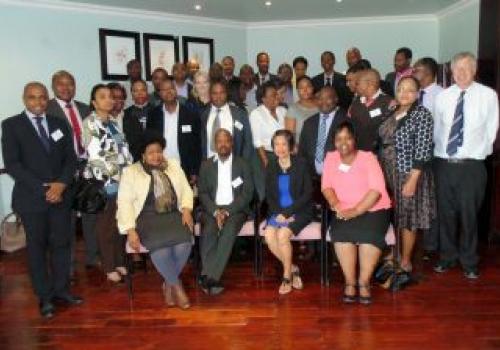The Trade, Industry, Finance and Investment (TIFI) Directorate through its Regional Economic Integration Support (REIS) Programme, facilitated a joint workshop of regional Value Added Taxe (VAT) and Excise experts in Gaborone Botswana, from July 23-25, 2014 to finalise Guidelines for cooperation in VAT and Excise taxes in the region.
The workshop was held in furtherance of the aims of the SADC Protocol on Finance and Investment (FIP) Annex 3 “Cooperation in taxation and related matters” that provides the mandate for regional tax cooperation including Article 6 that covers cooperation in indirect taxes. The FIP aims to harmonise the administration of indirect taxes, including excise tax rates and VAT exemptions and to increase information exchange between the Member States.
VAT and excise taxes are the main indirect taxes in the region and they are increasingly important sources of domestic revenue for the SADC Member States in seeking to sustain their fiscal independence whilst reducing reliance on customs duties. They are also important in a regional context as they are charged on most of the goods and services traded between the Member States, impacting business across the board. Wide variations in VAT or excise tax rates, or the items taxed, especially for things that are subject to both VAT and excise tax (such as tobacco products and alcoholic drinks), can create incentives for cross border shopping, smuggling, tax fraud and other criminality, as well as adding to the complexity of doing business in the region.
In order to operationalise Article 6 of the FIP, the SADC Tax Subcommittee was mandated in 2011 to develop regional Guidelines for both VAT and Excise, as regional frameworks for Member States to use in converging policies and practices. As VAT and Excise are different in terms of their design and application the Guidelines were developed separately by two technical sub-groups of regional experts, over a three year period.
Although the Guidelines have been developed separately, the Secretariat has ensured synergies in terms of style and presentation and both the VAT and Excise Guidelines comprise a two part format, whereby the Guidelines are relatively brief statements of practice, supported by a Commentary that contains technical explanation and detail.The workshop had 100% participation of VAT and Excise experts from the Member States and in addition to achieving the milestone of finalising the drafts, the workshop participants developed prioritised implementation plans for both the VAT and Excise Guidelines so that momentum is maintained during the approval process.
Although the finalisation of the VAT and Excise Guidelines at the officials’ level is a milestone on the road to achieving regional tax cooperation, the achievement must not be understated. Tax cooperation on any basis is challenging as it inevitably impacts on the fiscal sovereignty of the Member States and also because tax policy varies enormously between jurisdictions, reflecting the wide range of economic and developmental objectives in the region.That the Member states have, at the technical level, been able to build consensus on common frameworks in this area, in a relatively short period, is a tribute to the spirit of cooperation in the region. The input of the individual tax experts who took time away from their normal duties to contribute to the regional effort is also to be acknowledged.

